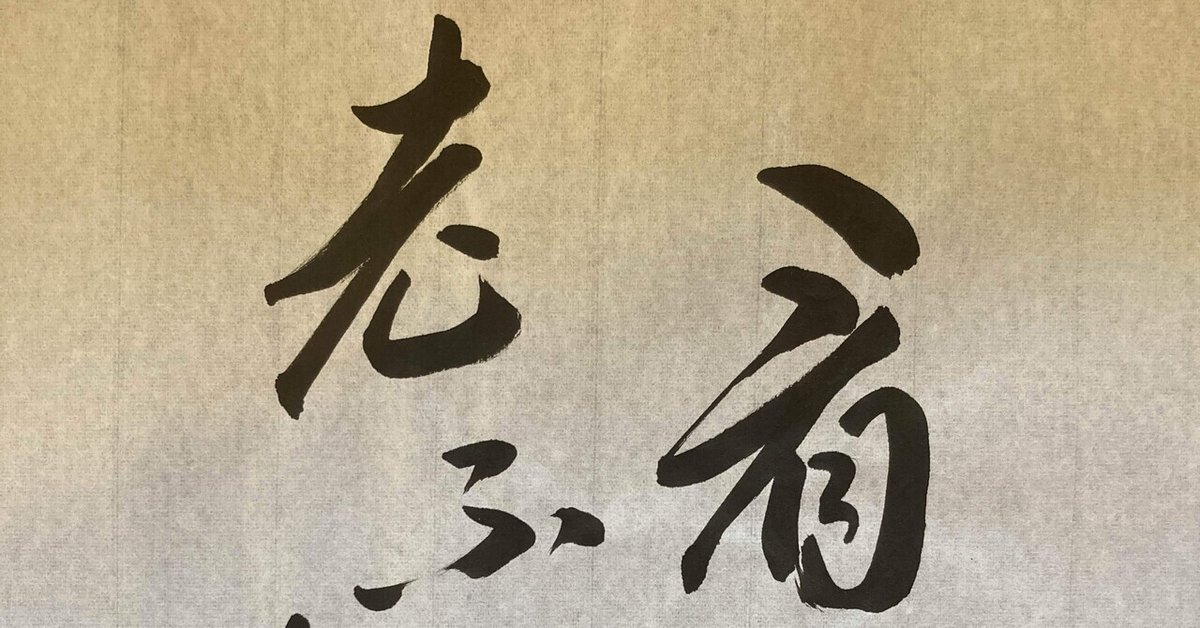
【禅語 Zen Words】看花老不知(はなをみるもの おいをしらず)Those who see flowers never grow old ’hanawo mirumono oiwo shirazu’
看花老不知(はなをみるもの おいをしらず)
美しい花を愛する人は、いつまでも老いることを知らない。という意味の禅語です。
ところで、そもそも「老いる」とはどういうことでしょうか。
普段私たちは「老いる」という言葉をどんな時に使っているでしょうか。
私の場合は、単純に年月を経ることや、身体の機能が衰えていくこと、あるいはそういう変化にともなって精神的にリスクを避けがちになることなどについて、「老いる」と表現していることが多いように思います。皆さんはいかがでしょうか。
一般的に「老いる」という言葉から、時間の経過に伴う身体的・精神的な少しネガティブな変化をイメージすることが多いのではないでしょうか。
では、この禅語はなぜ「花を看る人は老いない」と言っているのでしょうか。
どうやら、この禅語の言う「老い」とは、「時間の経過やそれに伴う身体的精神的な変化」のことではなさそうです。
私は、この禅語のいう「老い」を、「感動する心が失われること」と考えるとわかりやすいと思っています。感動とは、深く感じて心が動くこと。つまり、この禅語の指す老いとは「自分の心の感度」の劣化を「老い」と表現していると考えられます。
さて、これを禅的に考えてみると、花を見て美しいなぁと心が動くのは、あなたが花を見るまさにその瞬間に、精一杯咲いてる花の命に自分の命が共鳴するからと言えそうです。
感動する。つまり深く感じて心が動くのは、花という対象を単に対象物として眺めるのではなく、無意識に対象と自分とが一つになって共鳴しているということなのでしょう。
私は、死ぬまで感動し続けたいと思っています。
ポジティブな感動も、ネガティブな感動も、ともに味わい続けたいと思っています。
心が動くことこそ、生きる楽しみであり醍醐味であると感じています。
時間の経過や身体的精神的衰えに左右されず、「心の感度」を楽しむコツは、好奇心を全開にしたまるで赤子の視点で世界と自分を観察することだと私は思っています。
この禅語は、時間と共に無意識で自分の心に堆積してしまう「常識」や「偏見」や「善悪の判断」などを流し去り、まっさらな目線で見てみることこそが、「心の感度」を曇らせず、つまり「老い」ることなく世界を味わうことだと、教えてくれているのだと、私は考えています。
'Those who see flowers never grow old'
This is a Zen expression meaning that a person who truly sees beautiful flowers will never grow old.
What does it mean to ‘be old’?
What does it mean to ‘grow old’?
In my case, I think I often use the term ‘grow old’ simply to describe the passing of years, the decline of bodily functions or the tendency to mentally avoid taking risks due to such changes.
How about you?
Generally speaking, the term ‘growing old’ may conjure up images of slightly negative changes, both physical and mental, that accompany the passage of time.
Then, why does this Zen phrase say that a person who gazes at flowers does not become old?
Possibly, the ‘growing old’ referred to in this Zen expression does not refer to the passage of time and the physical and mental changes that accompany it.
I think it is easier to understand this phrase if we think of becoming old as ‘losing the ability to be moved in our hearts’.
To be moved means to feel things deeply.
In other words, the aging referred to in this Zen phrase can be thought of as describing the deterioration of the ‘sensitivity of one’s heart’.
Thinking about this from a Zen perspective, we can say that when you see a flower and your heart is moved by its beauty, it is because your own life resonates with the life of the flower, fully blooming at the very moment you see it.
You are moved. In other words, what moves you deeply is not just merely looking at the flower as an object, but unconsciously resonating with the flower as one with yourself.
I want to continue to be moved until I die. I want to continue to experience both positive and negative emotions. I feel that being moved is the joy and thrill of living. I believe that the key to enjoying ‘sensitivity of heart and mind’, unaffected by the passage of time or physical or mental decline, is to observe the world and oneself from the perspective of a baby, as if one's curiosity were fully opened.
I believe that this Zen phrase teaches us to shed the ‘common sense’, ‘prejudice’ and ‘judgment of right and wrong’ that we unconsciously accumulate in our minds over time and to look at the world with an unclouded eye, without letting our capacity to be moved to become clouded, or perhaps in other words, without growing ‘old’.
